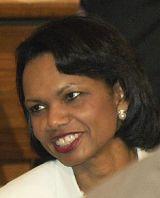US Rice urges accelerated AU deployment in Darfur
DAKAR, July 20 (AFP) — US Secretary of State Condoleezza Rice urged the African Union on Tuesday to cut through any bureaucratic or political obstacles and speed its deployment of troops to Sudan’s war-ravaged region of Darfur.
 Rice also welcomed formation of a unity government in Sudan as a “positive development” but stayed prudent on a lifting of US sanctions or the return of a US ambassador to Khartoum after eight years’ absence.
Rice also welcomed formation of a unity government in Sudan as a “positive development” but stayed prudent on a lifting of US sanctions or the return of a US ambassador to Khartoum after eight years’ absence.
On her first African trip as chief US diplomat, Rice signaled some concern over the progress of the AU’s plans to more than double its Darfur monitoring force to more than 7,700 by September.
“We believe this ought to be an AU mission, Rice told reporters on her plane en route from Washington. “But we also believe the AU has to move. And it cannot get caught up in any bureaucratic or political concerns.”
An estimated 180,000 to 300,000 people have died in Darfur, with some 2.6 million civilians left homeless, since February 2003 when fighting erupted between rebels and government forces backed by local militia.
Rice was due to travel Thursday to Darfur, in western Sudan, to get a first-hand look at what the United States has branded genocide and the United Nations has called the world’s worst humanitarian crisis.
She did not elaborate on what might hold up the African Union deployment but said she spoke to UN Secretary General Kofi Annan about it earlier Tuesday before leaving the United States.
Rice said she had also spoken to some US senators about “making sure that the AU is making progress toward getting their forces in because we know that in areas where there are monitors, the violence diminishes.”
“My understanding is that there are some forces that are very nearly ready to move but I’ll have a better sense of that when I’m out there,” said the secretary, who was due to greet 95 arriving troops from Rwanda.
Rice expressed confidence that a peace accord signed in January to end more than two decades of civil war between Khartoum and rebels in Sudan’s south would give new impetus to resolve the Darfur crisis.
But she made it clear that Washington would hold the government accountable for continuing violence. The United States backed UN resolutions adopted to punish war criminals in Darfur and threaten sanctions against Khartoum.
Rice said John Garang, former southern rebel chief and Sudan’s new vice president, “has been saying the right things about Darfur” but added, “we would obviously like to see an active role there.”
She said the United States was working two parallel tracks with Sudan: pressing Khartoum on Darfur while supporting January’s peace agreement that produced a national unity government this month.
“The addition of the elements from the south will be a positive development but I wouldn’t expect the things to change overnight,” Rice said.
She said the question of lifting US economic, trade and financial sanctions imposed in 1997 “will eventually be revisited” once concerns over Darfur and Sudan’s alleged support for terrorism were resolved.
But she stayed non-committal about prospects for posting a US ambassador to Khartoum for the first time since late 1997. The US mission is currently headed by a charge d’affaires.
“We’ll just have to see,” Rice said when asked about the return of an ambassador. “I do think we need more from the Sudanese government, the north and the south, to address some of the issues.
“But we’re looking to the day we can put representation there because obviously things are changing pretty quickly in Sudan.”
Rice flew to Senegal to attend the US-Sub-Saharan Africa Trade and Economic Cooperation Forum, dubbed the AGOA Forum after American legislation to grant duty-free trade terms to nearly 40 countries.
